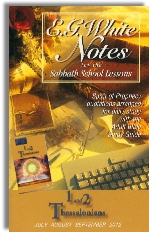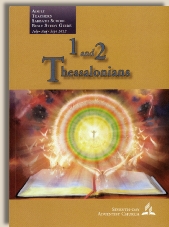|
||||||||||||||
Commentary on "Thessalonica in Paul's Day"
Day 6: Thursday, July 19, 2012 - Home Churches
Overview
An entire section is dedicated to the description of what constituted a Roman house. The rationality behind using the space of an entire day for this relatively minor subject comes from the fact that in his epistles the apostle Paul writes frequently about churches which have their gatherings in private, particularly houses. Jon Paulien ponders the missionary advantages to having a house-building in close contact to other business enterprises and also to having a large house where many people living in it can be persuaded by the owner toward faith.
Observations
The Bible has no basis for Pauliens thesis that there are advantages to house architecture or that Paul had a strategy based on the ways and places houses are built. He's not hinting that the house-church is intentionally part of a successful strategy for ministry and church-planting. In the context of Thessalonica, it's not part of a specific approach that Paul had for this city, given the fact that there are other house-churches in other cities of the Roman world.
"For Christ did not send me to baptize but to preach the gospel, and not with words of eloquent wisdom, lest the cross of Christ be emptied of its power." (1 Corinthians 1:17 ESV)
Apostle Paul locates the power of his mission not in the strategy he embraced, not even in "words of eloquent wisdom", but in the message of the gospel itself. The message of the cross was the ingredient that assured his success:
"For the word of the cross is folly to those who are perishing, but to us who are being saved it is the power of God." (1 Corinthians 1:18 ESV)
Surely, Apostle Paul was eager to remove anything that might stand unnecessarily in the way of the gospel; he was eager to work with his hands and make his own living, but he didn't see these as parts of a strategy assuring the success. Anything Paul did in order to promote the gospel was not a method to enhance or augment the power of the gospel, but it was his style of getting out of the way and leaving room for the gospel to make its full impact, due to the regenerating work of the Holy Spirit.
"Now to the one who works, his wages are not counted as a gift but as his due. And to the one who does not work but believes in him who justifies the ungodly, his faith is counted as righteousness" (Romans 4:4-5 ESV)
The scandal and the power of the gospel is that God does not justify not the godly. God doesn't help those who help themselves; God justifies those who can't help themselves, the ungodly. All religions teach people that God is on the side of the godly, only Christianity preaches the opposite. The common wisdom of the religious man is, "If you are sorry, if you confess your sins and promise to forget it" God will pardon you. Forgiveness of sins is preached on the condition of people amending their life, striving to obtain a perfect record, and depending on it. Repentance is the condition of justification.
What Martin Luther understood when he nailed the 95 Theses on the door at the cathedral of Wittenberg was written clearly in the first thesis:
When our Lord and Master Jesus Christ said "Repent," he intended that the entire life of believers should be repentance
In this order, repentance is not the condition of justification; it cannot be; otherwise nobody would be justified. Repentance is a life-long experience, never complete, never perfect. If salvation depended on it, justification would never happen, or it would be incomplete. In fact, this was what the Roman Catholic Church taught in the days of Martin Luther and still teaches, and the Adventist gospel mirrors the Roman Catholic teaching about this subject.
Perhaps nowhere is this contrast more prominently illustrated than in the recent artistic movie Luther (2003) in the scene where, still a monk, Luther goes against his own church practice that was consistent with Roman Catholic theology. A young man commits suicide, and obviously that was a sin for which he had not repented, since he had no time and opportunity. A gospel dependent on repentance, on confessing sin, cannot save this poor guy, he's beyond repentance and consequently beyond salvation. He's an outcast; he cannot receive a Christian burial, he cannot be buried in a Christian cemetery. But Martin Luther takes the body, buries it in the Christian cemetery, performs a Christian burial ritual, and offers a compelling justification for what he did. He sees the young man as a victim overpowered by Satan, no different than a prey who had been defeated by the predator. Even if the young man who took his life had no time and opportunity for repentance, Luther already knows that God's power of salvation is not limited by this lack.
Unfortunately the Adventist teaching that salvation depends on confessing sins and that the blotting out of sins depends on confessing every sin and even gaining victory over them, offers the same hope (or lack of it) found in the teaching opposed by Martin Luther. There is grace, but it's not amazing; God justifies the godly, the repentant—only those who help themselves toward repentance, only those who confess every sin and gain victory over them. Only when people understand that God justifies the ungodly, and that, while calling to a life of repentance, God doesn't make his grace and favor dependent on this repentance, then the power of the gospel is unchained to transform people's lives.
Copyright 2012 BibleStudiesForAdventists.com. All rights reserved. Revised July 19, 2012. This website is published by Life Assurance Ministries, Camp Verde, Arizona, USA, the publisher of Proclamation! Magazine. Contact email: BibleStudiesForAdventists@gmail.com.
The Sabbath School Bible Study Guide and the corresponding E.G. White Notes are published by Pacific Press Publishing Association, which is owned and operated by the Seventh-day Adventist church. The current quarter's editions are pictured above.
Official Adventist Resources
Standard Edition Study Guide Week 3
Teacher's Edition Study Guide Week 3
Easy Reading Edition Study Guide Wk 3
Search the Complete Published Ellen G. White Writings
Please Support This Project


